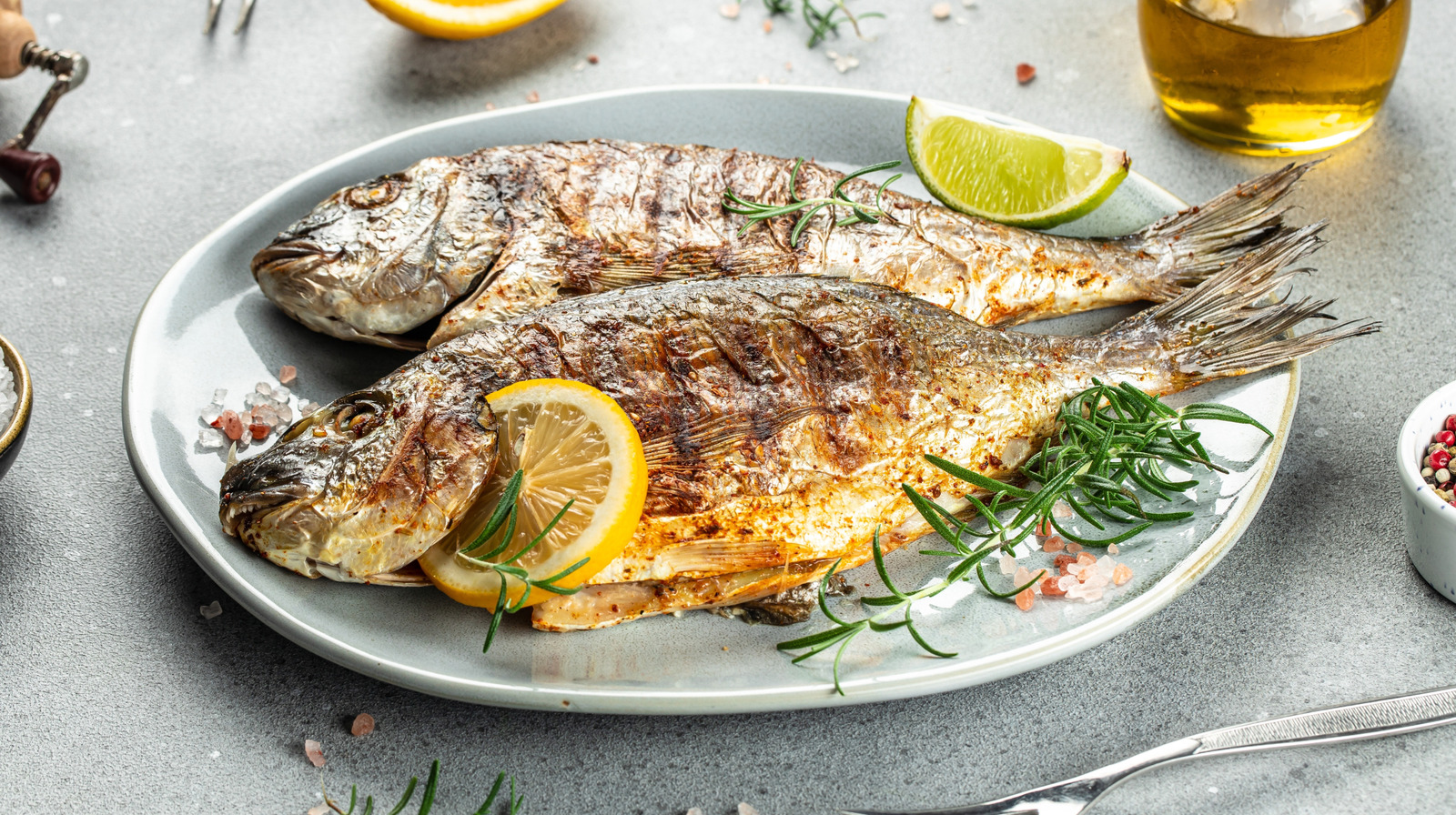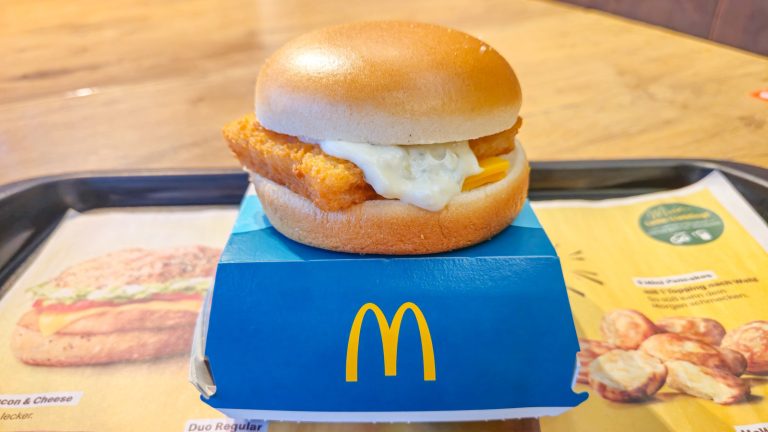With the weather warming up, it’s time to bring out those grills and dust them off. The season of barbecue is upon us. While most people will gravitate toward the more traditional grilling proteins — pork, beef, and chicken — the more adventurous may want to try something different: Fish.
Fish and other types of seafood are notoriously tricky to cook and grill. While it is possible to grill most kinds of fish, they do often require a few extra steps. Also, there are some kinds of fish that you may just want to avoid. That’s where this list comes in — the 12 worst types of fish for grilling. Now, again, this doesn’t necessarily mean that you can’t grill these kinds of fish. It’s more so that you may want to look in another direction, especially if you’re new to grilling.
When it comes to grilling fish, it’s important to keep it fresh and on ice. It’s also important to do all your seasoning before you start grilling and to give it a healthy dose. The most essential thing to remember — and the reason we have this list — is that not all fish are good for grilling. You’ll want something that is firm, and you’ll need to keep the grill super hot. The fish that belongs on your grill, according to many chefs, is a meatier fish, but many varieties don’t fit that bill. Without further ado, here are the worst kinds of fish to grill.
Flaky fish falls apart easily
As mentioned, meatier fish make for better grilling. On the other hand, really flaky fish make for not-so-great grilling and, in the end, create a big mess. The high heat of the grill can (and usually does) make delicate, flaky fish fall apart. Not only does this make it harder to flip or remove the fish from the grill in one piece, but you also run the risk of your fish falling through the grates. Think about that long clean-up. Flaky fish have tissues that don’t form very strong connections, which leads to the breakage.
We’re talking about fish like cod, pollock, or tilapia (which you’ll hear more about later). With their tendency to fall apart, they are better suited for other kinds of cooking, like pan-frying or baking. In fact, you can make crispy, flaky fish in an air fryer that is super delicious.
You could also try putting flaky fish in foil or something without grates before you put it on the grill. However, you’ll likely still have the issue of it breaking up when you try to cook the other side. Again, it’s not impossible to grill flaky fish, but with all the extra headaches, it’s not really worth it.
Skinless fillets dry out fast
A lot of recipes call for using skinless fillets when cooking fish, but this isn’t a great option when you’re grilling. Removing the skin makes the fish dry out more easily, plus without it, it’s more likely to stick to the grill (to be fair, you’ll also likely have to deal with that even with the skin). You need that outer layer to help keep in more moisture so you can avoid overcooking, which happens very quickly. Without the skin, all it takes is one minor distraction, and you’ve gone from a tasty, grilled fish fillet to fish jerky.
The skin also helps hold everything together, and it’s recommended that if you’re going to grill, grill the entire fish. Otherwise, you’re going to get a similar situation with flaky fish: It will fall apart and possibly fall through the grates. Not to mention, removing the skin makes things less flavorful. This mostly affects fish like walleye, perch or bass. If you keep the skin on, grilling is a lot easier. But if you want to cook a skinless fillet, it’s better to try another method.
Flatfish make for tricky grilling
Flatfish are common in the U.S. and can be incredibly delicious when cooked properly. However, you probably want to skip the grill when it comes to enjoying these water dwellers. These are fish that typically live at the bottom of a water source, and are, well, flat. However, it’s important to note that not all fish that are flat are flatfish — monkfish and rays, for instance, don’t fall in this category. We’re talking about varieties like flounder, halibut, and sole.
But why should you avoid grilling them? Because they are so thin, flatfish can’t handle the high heat of a grill as well as other types. They cook a lot faster, making it easy to dry them out or overcook before you know it. They also fall apart a lot more easily. So, not only are they tricky to get right, they’ll also make for a more complicated clean-up afterwards, even if you use a grill basket.
Rather than bringing out the grill, consider pan-frying or roasting. Even baking in an oven is a good option. You still get all that flavor and a well-cooked fish without having to constantly monitor it to keep it from losing moisture or falling through the grates.
Avoid grilling fish that need subtle cooking methods
There are some fish out there that work better with more delicate cooking methods than grilling, and these are the ones you want to avoid. High heat is not your friend here; it does a lot more harm than good with some types of very delicate fish. We’re talking about fish that would do better with a much gentler cooking method, such as sous vide. Over all, these fish need a method that helps to preserve their subtle flavor and keeps them from losing moisture too quickly.
It’s incredibly important to think about the best way to cook your fish before firing up the grill. Perhaps before you even go to the grocery store or fish house. Fish that need a softer touch are haddock, snapper, or halibut. Also, tilapia falls under this category. It’s probably one of the more common fish to cook at home, but there are a few more things to know before eating it again. Rather than attempting to grill any of these guys, go for poaching or steaming instead. You’ll get a juicy fish full of enough flavor that it’ll dance on your tongue.
Can’t handle the heat, get off the grill
If it’s not clear by now, fish are incredibly finicky when it comes to cooking, whatever the method, and not all are the same. Different kinds of fish require very specific cooking temperatures. Not all of them can handle the heat. Because of their low collagen content when compared to other proteins, fish require a lot more attention in any cooking method.
You want to take a very close look at the recommended cook temperature before tossing any type of fish on the grill. Also, stick to sturdy, oily fish for those outdoor barbecues. Avoid fish that need lower temps, like black cod or even tuna. To be fair, tuna is better when served rare or just seared anyway. If you want to try grilling these fish, you can, but be ready to constantly watch and pull them off before the heat overwhelms them. It’s easier to just avoid grilling these fish altogether and go for another more appropriate method.
Frozen fish can turn mushy
While some kinds of fish are better cooked from frozen, when it comes to the grill, this isn’t the greatest option. Frozen fish, even when thawed, doesn’t have the same texture as fresh fish. It’s very easy for your fish to turn mushy while you’re grilling due to its water content. This can spell disaster when it comes time to put it on the grill, making your fish break apart and become a big mess rather than a delicious feast.
You also have to keep in mind that when cooking from frozen, the large release of moisture makes the fish steam instead of cooking how you want it to. Therefore, cooking from frozen also makes it harder to sear your fish. Both are fairly important when cooking on the grill. There’s also the skin to keep in mind. While grilling fresh fish with the skin on gets it nice and crispy, grilling frozen fish with the skin on makes it soft and weak.
There is a correct way to cook frozen fish, but grilling just isn’t it. If you only have access to frozen fish, you may want to skip bringing out the grill for it and consider making something on the stove or in the oven.
Lean freshwater fish are too delicate
Now, everyone in landlocked states is probably wondering how freshwater fish do on the grill. You spend a few hours at the lake and pick up some perch or bass. Maybe walleye. Perhaps you had a big noodling trip with your friends and brought home a giant catfish. Can those go on the grill? Well, technically, yes, but it’s not the best way to cook those fish.
Lean freshwater fish are more delicate and therefore harder to grill. They have very soft flesh and a lower fat content than darker-flesh varieties. This means they are more likely to fall apart on your grill or dry out if you aren’t careful. They’re also more likely to stick to the grill, which makes for a messy cooking experience.
An easier way to cook lean freshwater fish that keeps them moist and flavorful is to steam, pan-fry, or deep-fry it. You don’t have to worry about these fish breaking up or sticking to your grates, especially since most of them are best cooked as fillets and deboned. If you’re still a bit unsure, try using a test fillet to help with stress-free cooking. You can then find out how you enjoy cooking freshwater fish before you have to serve it to the family.
Grilling can melt some fish bones
Grilling isn’t the best option if you’re planning to cook some types of cartilaginous fish. Now, what is that? Well, these are fish that have cartilage instead of bones, like sharks, rays, and skates. If you’re living far away from a coast, you’re probably not going to find this at the grocery store, but for people in other areas or who enjoy deep-sea fishing, there’s a chance you’ve probably had or cooked a ray or skate. There are also certain kinds of sharks that are legal to fish and cook. Sharks are typically okay to grill, mostly because they have a similar consistency to a steak. Just make sure you’re getting them from a reputable source, since there is a lot of overfishing going on.
However, for rays and skates, you might want to think of other cooking methods. When it comes to cooking rays, most recipes call for boiling or frying, usually pan-frying. You’ll also want to stick with larger rays, which have more meat on them. And before you knock it because of how strange they look, many people say sting rays taste similar to scallops. However, scallops you can toss on the grill, while rays are more able to shine in a pan on the stove.
Fish with strong flavor is too intense on the grill
If you have any kind of grilling experience, then you’re probably aware that it enhances the flavor of your food, be it a nice, thick burger or veggie and shrimp kebabs. Grilling makes your steak or ribs taste more savory, or hickory-smoked, if you’re smoking them. This also applies to fish, but it’s not always a good thing. Sure, a mild-tasting fish may come out just fine, but something a bit more distinct may not.
Now, this could be as simple as getting a strong “fishy” taste because you didn’t properly ice and store your fish before cooking. But it also has the same effect when you grill any fish that has a naturally strong flavor. Typically, fish with a higher fat content have a stronger taste. This can be salmon, mackerel, herring, or carp.
You can always try to offset this by marinating, basting, or seasoning your fish before you put them on the grill. However, it’s better (and probably easier) to find another way to cook them, such as baking or pan-frying. It’ll come out tastier, and you won’t need to turn your kitchen and porch into a science lab to figure out the right combination of seasonings and the right temperature to use on the grill.
Very small fish can fall through the grill
While it is possible to grill very small fish like sardines and anchovies, they are definitely a type you’ll want to pass on if you’re still getting the hang of grilling because of their size. They can be tricky to handle, whether it’s making sure they don’t fall through the grates or that you don’t accidentally burn them. Unless you know exactly what you’re doing, you might want to skip these or cook them another way. Not to mention, depending on where you live, it can be hard to come by fresh sardines or anchovies. Most areas, especially landlocked states, really only have the canned variety.
If you’re still keen on trying to grill them, you’ll need a grill basket. Also, because of their size, they dry out much faster. If that’s not your goal, you might find yourself in that situation anyway if you don’t keep a very close eye on them and monitor the temperature of your grill. There are other considerations to keep in mind outside of prep and grilling techniques, such as whether your sardines are sustainably sourced. Again, it’s not impossible to grill very small fish, but it does require a lot more effort and work.
Fish with fine bones are too brittle
There’s nothing more annoying than placing a nice, juicy hunk of grilled fish into your mouth, only to have your tongue and the roof of your mouth pricked and prodded by tons of sharp, brittle bones. It’s not fun and kind of ruins the experience. This is why you want to avoid grilling fish that have fine bones, which can turn especially brittle when heated on a grill. While it is true that you can soften fish bones when you cook them at higher temperatures, some types of fish aren’t good options for high heat. We don’t know about you, but picking bones out from your teeth or elsewhere doesn’t sound enjoyable.
When it comes to these kinds of fish, you’ll want to poach them instead of grilling, since this is the best way to soften the bones. That way, you can get a nice flavor and texture, and avoid some mouth injuries. Also, poached fish is great for many different dishes, like salads or soups.
Fish with a lot of fine bones include shad, northern pike, carp, and herring. It can be a chore trying to avoid the bones in these fish after grilling. Even for fish that you can grill, like branzino, it’s recommended to debone them after cooking. You could stick to fillets that have been deboned rather than grilling the entire fish whole, though, as mentioned above, skinless fillets aren’t the best option for grilling, either.
Old fish shouldn’t be grilled
Obviously, most people know that you shouldn’t cook spoiled fish — that’s a given. It’s the same reason why you make sure that your beef, chicken or pork hasn’t gone bad before cooking. And it’s not only limited to grilling. However, we’re talking about fish that may not quite be at its expiration date and can still safely be eaten. Perhaps it’s on the cusp of it and still technically okay to cook and enjoy. With this type of fish, you don’t want to attempt to throw it on the grill.
How can you tell if a fish or any other kind of seafood is truly fresh? First of all, it doesn’t have a smell. It also doesn’t have a bad taste. You’ll need to touch the fish to help with this, too. If it is past its prime, it’ll probably feel a bit slimy. It might also feel a bit mushy when you press down on it.
When it comes to fish and other seafood, you’ll want to cook it soon after you get it — within a couple of days, ideally – unless you plan to freeze it. In that case, it can last months in your freezer. So if you’ve had that salmon in the fridge for five or so days, you might want to skip grilling it. In fact, you might want to skip cooking it altogether. When shopping at the grocery store, old fish is definitely something to be on the lookout for and avoid buying, along with some other seafood items.





